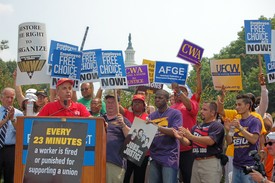
Original source:
Over the past few months, we’ve had conversations across our union and across our country about how to improve the lives and future of working families.
The good news is that for the first time in eight years, we have a President and Vice President who understand how critical working people are to the fabric of our economy and our nation. In just a short time, we’ve seen decisive action from the Obama administration, including an economic recovery plan that has help for working families and a renewed focus on jobs.
The not-so-good news: there’s a lot more that must be done to turn around our struggling economy and provide the support that working families need.
The Wall Street and banking and investment interests that have run our economy into the ground can’t be allowed to control our economic future. Our economic recovery can’t be about avarice or about how much investors and monied interests feel entitled to take. This economic crisis wasn’t only caused by homeowners getting in over their heads, it was caused by greed and overreaching by investors and by the extreme income inequality that has been rampant in this country for several decades.
This one-sided focus on capital, unfair trade and markets has produced an economy in which people don’t have health care, quality jobs or the ability to move forward confidently into the future.
That’s why our agenda for working families — jobs, real health care reform, retirement security and bargaining rights — goes forward.
And a part of that agenda is putting elected officials on notice that they are accountable for the actions they take that help — or harm — working families.
In many measures, working families in the United States continue to lag far behind working families in the world’s other industrial democracies, according to the Organization for Economic Cooperation and Development, which tracks economic, environmental and social conditions in 30 developed countries.
Health care? The United States now spends 17 percent and more of our Gross Domestic Product on health care, twice that of other industrial democracies. Yet 46 million Americans have no health care. U.S. businesses that do provide coverage for employees face a competitive disadvantage compared to other U.S. employers who offer inadequate or no benefits and corporations in the rest of the industrial world where health care benefits are viewed as critical public policy.
Pensions and retirement security? For working families, the percentage of income replaced by Social Security and private pensions is lower in the United States than in any other OECD country with the exception of Mexico.
Jobs and fair trade? In the United States, our trade practices have been based on markets and some imbalanced notion of ‘free trade.’ Capital calls the shots. In other industrial democracies, workers’ interests also carry weight in setting national trade policy.
Bargaining rights? The U.S. has the worst record of any democracy — with the exception of Colombia — when it comes to workers having a seat at the table with corporations in order to work out solutions to workplace and economic problems.
Wall Street loves to talk about the global economy and how workers must adapt to the global marketplace except when it comes to bargaining rights. This must change.
The Employee Free Choice Act ties all these issues together. Real bargaining rights are essential if working families are going to regain our economic standing. Despite what some Washington politicians and pundits say, popular support for the Employee Free Choice Act is stronger than ever.
Communication Workers of America and the entire labor movement, along with supporters from public interest, religious, civil rights, women’s groups and many other organizations are determined to build on that support and win the bargaining rights that working families need. It’s time we had an economy that works for everyone.
Larry Cohen is the president of the Communication Workers of America. You can follow CWA on Twitter during its upcoming Convention and Legislative-Political Conference, June 22-25, 2009, http://twitter.com/cwaunion.

MOST POPULAR TODAY

Zionist organizations leading campaign to stop ceasefire resolutions in D.C. area


High Court essentially bans demonstrations, freedom of assembly in Deep South

Afghanistan’s socialist years: The promising future killed off by U.S. imperialism

Communist Karol Cariola elected president of Chile’s legislature





Comments